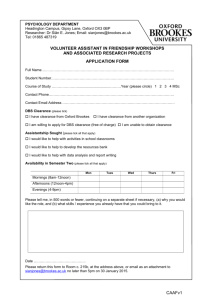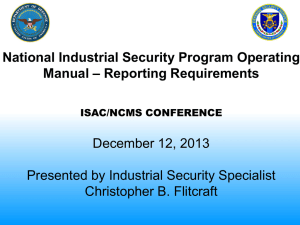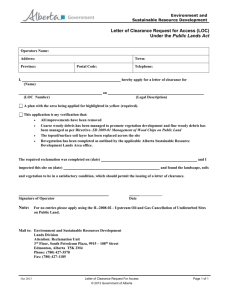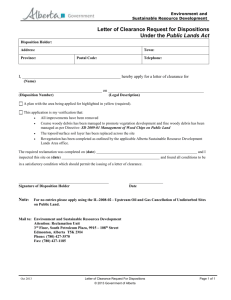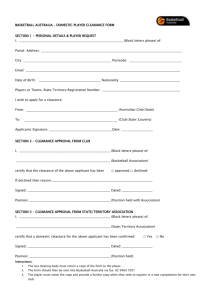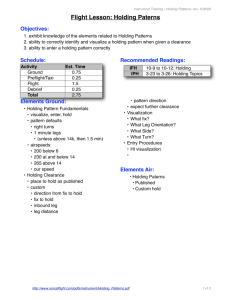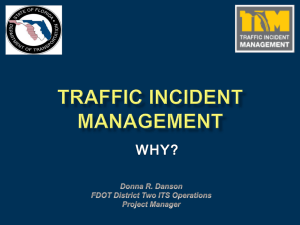what is the annual security refresher briefing
advertisement
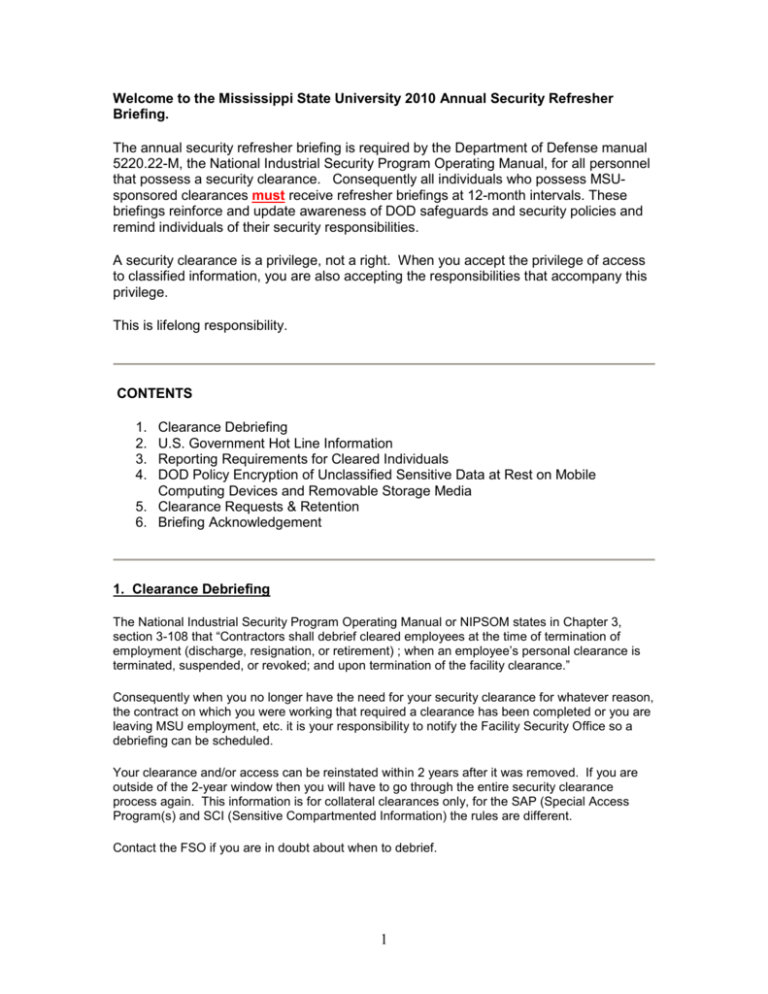
Welcome to the Mississippi State University 2010 Annual Security Refresher Briefing. The annual security refresher briefing is required by the Department of Defense manual 5220.22-M, the National Industrial Security Program Operating Manual, for all personnel that possess a security clearance. Consequently all individuals who possess MSUsponsored clearances must receive refresher briefings at 12-month intervals. These briefings reinforce and update awareness of DOD safeguards and security policies and remind individuals of their security responsibilities. A security clearance is a privilege, not a right. When you accept the privilege of access to classified information, you are also accepting the responsibilities that accompany this privilege. This is lifelong responsibility. CONTENTS 1. 2. 3. 4. Clearance Debriefing U.S. Government Hot Line Information Reporting Requirements for Cleared Individuals DOD Policy Encryption of Unclassified Sensitive Data at Rest on Mobile Computing Devices and Removable Storage Media 5. Clearance Requests & Retention 6. Briefing Acknowledgement 1. Clearance Debriefing The National Industrial Security Program Operating Manual or NIPSOM states in Chapter 3, section 3-108 that “Contractors shall debrief cleared employees at the time of termination of employment (discharge, resignation, or retirement) ; when an employee’s personal clearance is terminated, suspended, or revoked; and upon termination of the facility clearance.” Consequently when you no longer have the need for your security clearance for whatever reason, the contract on which you were working that required a clearance has been completed or you are leaving MSU employment, etc. it is your responsibility to notify the Facility Security Office so a debriefing can be scheduled. Your clearance and/or access can be reinstated within 2 years after it was removed. If you are outside of the 2-year window then you will have to go through the entire security clearance process again. This information is for collateral clearances only, for the SAP (Special Access Program(s) and SCI (Sensitive Compartmented Information) the rules are different. Contact the FSO if you are in doubt about when to debrief. 1 2. U.S. Government Hotline Information Federal agencies maintain hotlines to provide an unconstrained avenue for government and contractor employees to report, without fear of reprisal, known or suspected instances of serious security irregularities and infractions concerning contracts, programs, or projects. These hotlines do not supplant contractor responsibility to facilitate reporting and timely investigation of security matters concerning its operations or personnel, and contractor personnel are encouraged to furnish information through established channels. However, the hotline may be used as an alternate means to report this type of information when considered prudent or necessary. The DOD Hotline address, telephone number & Internet info is as follows: Defense Hotline The Pentagon Washington, DC 20301-1900 (800) 424-9098 E-mail: hotline@dodig.osd.mil Web: http://www.dodig.osd.mil/hotline Other Hotline numbers: Federal Bureau of Investigation The FBI has 56 field offices – Columbus, MS (662) 328-5299 Defense Department 1-800-424-9098, (703) 693-5080 Defense Security Service (DSS) (256) 876-1548 Huntsville Field Office Defense Intelligence Agency (703) 907-1307 National Security Agency (301) 688-6911 Department of Army 1-800-CALLSPY Naval Criminal investigative Service 1-800-543-NAVY Air Force Office of Special Investigations (202)767-5199 Central Intelligence Agency Office of the Inspector General (703) 874-2600 2 Department of State Bureau of Diplomatic Security (202) 663-0739 When traveling overseas, suspect incidents should be reported to the Regional Security Officer (RSO) or Post Security Officer (PSO) at the nearest U.S. diplomatic facility. Department of Energy (202) 586-1247 U.S. Nuclear Regulatory Commission Office of the Inspector General 1-800-233-3497 3. Reporting Requirements for Cleared Individuals All Cleared Personnel Have the Following Reporting Responsibilities: 1. Adverse Information Adverse information is any information that adversely reflects on the integrity or character of a cleared employee, which suggests that his/her ability to safeguard classified information may be impaired, or that his/her access to classified information clearly may not be in the interests of national security. You must report the following types of information about yourself or other employees: arrests or convictions for criminal offenses including drunk driving; financial difficulties, including bankruptcy, excessive indebtedness, and wage garnishments; bizarre or notorious behavior; alcoholism, use of illegal drugs, or abuse of legal drugs; emotional or psychological problems requiring treatment or hospitalization; affluence (wealth, acquisitions, investments) beyond known sources of income. 2. Change in Personal Status If you have a collateral CONFIDENTIAL, SECRET, or TOP SECRET clearance, you must report: a change in name; a change in marital status (i.e., marriage or divorce); a change in citizenship; when access to classified information is no longer required due to a change in job assignments. Note that if you have access to SAP/SAR/SCI or National Programs, you must report other changes in personal status including family deaths and births, change of address, and inheritances. 3. Representative of a Foreign Interest (RFI) You must report when you begin to act as a representative of or consultant to any foreign entity, including a government, a government agency, a commercial business, or a person. 4. Security Violations/Vulnerabilities 3 You must report any known or suspected security violation or vulnerability of which you become aware, independent of who is responsible or at fault for the situation. Security violations/vulnerabilities include: the careless or unintentional failure to comply with security requirements for safeguarding classified information; the intentional disregard of security requirements; any failure to comply with security requirements, regardless of intent, that has resulted in the loss, compromise, or suspected compromise of classified information; the unauthorized receipt of classified material; significant vulnerabilities discovered in equipment or systems designed to protect classified information. 5. Suspicious Contacts You must report: any efforts by any individual, regardless of nationality, to obtain illegal or unauthorized access to classified information or to compromise any cleared employee; any contact by a cleared employee with known or suspected intelligence officers from any country; any contact which suggests you or another employee may be the target of an attempted exploitation by the intelligence services of another country. All reports should be made to the Mississippi State University Facility Security Office. Also if you have any policy concerns with any of the above Reporting Requirements contact the Facility Security Office, telephone 662-325-8682 and email, nelewis@fso.msstate.edu 4. DOD Policy – Encryption of Unclassified Sensitive Data at Rest on Mobile Computing Devices and Removable Storage Media The policy and Frequently Asked Questions document regarding the encryption of unclassified sensitive data at rest on mobile computing devices and removable storage can be found by accessing the following links, DOD Memo Encryption for Data at Rest.pdf and faq_dar_encryption_policy_memo_18mar08_update-6_final.docx The DOD originally targeted Personally Identifiable Information or PII, since the DOD had numerous incidents of losing, the stealing or just downright negligence of not sanitizing before disposal of mobile computing devices and removable storage media. Since the trend is towards utilizing highly mobile computing devices and removable storage media the DOD was also concerned about unclassified data that may be contained on these devices. This is why they decided to go the extra step and encrypt all unclassified sensitive data which is defined as “any data that has not been authorized by the DOD for public release.” For now this pertains to DOD data and information only, however it is good security practice to protect any sensitive data whether it is U.S Government, commercial industry 4 or MSU owned. Also remember this is unclassified data or information. When it comes to classified data or information the rules and regulations are much stricter. If there are any questions, please contact the FSO. 6. Clearance Requests & Retention Per the National Industrial Security Program Operating Manual, better known as the NISPOM section 2-200 d: “The contractor shall limit requests for personal clearance levels (PCLs) to the minimal number of employees necessary for operational efficiency, consistent with contractual obligations and other requirements of this Manual. Requests for PCLs shall not be made to establish “pools’ of cleared employees.” This can also be stated as, “Am I actively engaged in a contract or other university obligation that requires me to have a security clearance?” If the answer is no, then you need to have your access removed. The key word in the preceding sentence is “access”. Your security clearance never really goes away just your access to classified information is what is cancelled. Security Clearance + Need to Know = Access Please take the time to review your security clearance requirement. Ask yourself the following questions: Am I actively engaged in a contract that requires a security clearance? Do I require a security clearance to represent MSU in classified meetings, presentations, seminars, etc. that are actively benefiting the university? When in doubt, or if have questions, please contact the FSO. 7. BREIFING ACKNOWLEDGEMENT Please email Neil Lewis (nelewis@fso.msstate.edu) to acknowledge that you have read this version of the ORED/FSO Security Refresher Briefing. Include the following statement in the body of your message: I acknowledge that I have received and read the 2010 ORED/FSO Annual Security Refresher Briefing in compliance with U.S. Department of Defense security training requirements. It is important to include your name after the above statement. I will be contacting you if your email statement is not received by the time stated in the email notifying you of the annual security refresher requirement. If there are any questions please do not hesitate to contact me. 5 6
